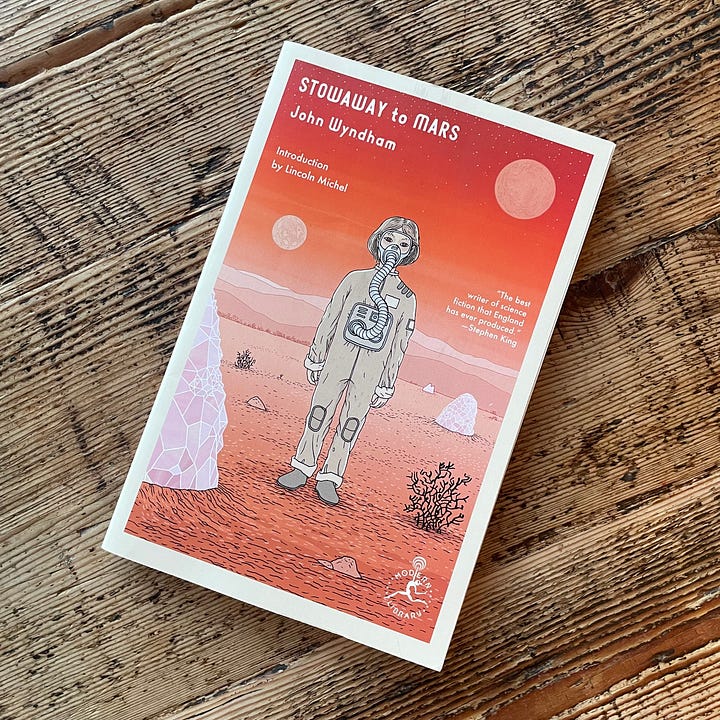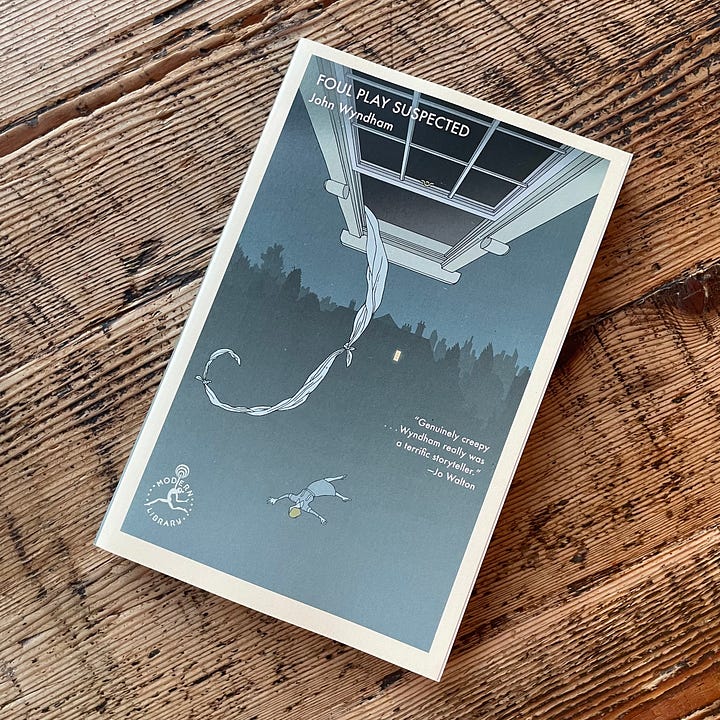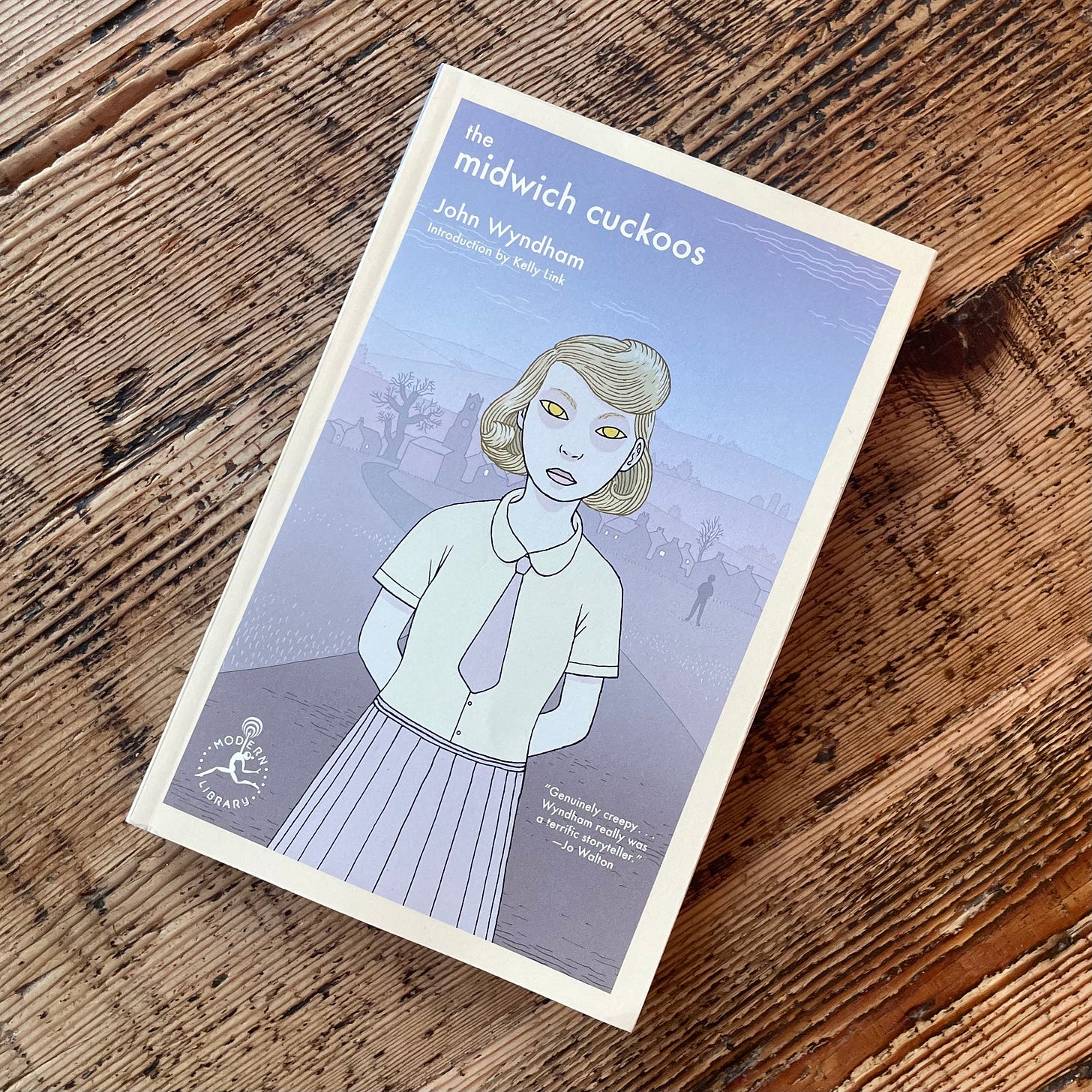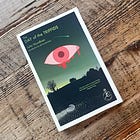Margaret Atwood devoured his novels as an adolescent and teenager, and Stephen King says he’s Britain’s best science-fiction writer. But I had never even heard of John Wyndham until recently, let alone read any of his books. It was time to remedy my deficiency.

I’d heard of Wyndham’s popular 1951 novel, The Day of the Triffids, though I didn’t know he’d written it. Rather, I vaguely knew there was a book about killer plants that set the template for a lot of later postapocalyptic fiction. I finally got around to purchasing a copy while looking for classic horror novels to read during Halloween—though I jumped the gun and read it in September.
Verdict? Triffids was loads of fun (you can read my review here). So, when I realized Modern Library had rereleased several additional Wyndham’s novels, I bought a handful and settled in for more.
To my mind, the best sci-fi proposes thought experiments in the shape of stories. Imagine that X occurs, then what? Wyndham referred to it as “logical fantasy.” The formula can be especially effective when contemplating catastrophes.
How do we respond when, say, people develop a means to radically extend human life, or every woman of childbearing age in a small town simultaneously and mysteriously becomes pregnant, or aliens invade our oceans and melt the polar icecaps? To entertain such questions is to find yourself a couple chapters into a John Wyndham novel.
Most of Wyndham’s books present an unimaginable catastrophe his characters are forced to navigate. Triffids provides the classic example. What happens to society when most people on the planet lose their sight in a freakish accident involving atmospheric radiation while giant genetically modified carnivorous plants get loose and start multiplying uncontrollably? It’s a problem!
While “farfetched” doesn’t even start to characterize the plot, the story does draw attention to how utterly interdependent and contingent all our economic and commercial systems are. If one piece breaks down there, it soon affects us here. What happens when we multiply the breakdowns? Everything grinds to a halt—and much, much worse.
Trouble with Lichen, published in 1960, imagines a rare genetic compound, accidentally and independently discovered by a pair of biochemists from an imported lichen, that can double, triple, even quadruple human lifespans. Unable to synthesize the compound, they keep the discovery a secret but do so in radically different ways for radically different reasons.
The heroine sees the drug as means for female empowerment. Working with the limited amount of lichen she can import, she starts a cosmetics company that doses women without their knowledge. What gave her the idea? Realizing that raising families takes women more than half their lives. What if Mom has other dreams to pursue? She’ll need a second life for that, and—wouldn’t you know it?—here’s just the thing.
Of course, radically extended lifespans might come with complications of their own. Will marital expectations be renegotiated in a world where adult men and women might spend not simply decades but even centuries with each other? Drew Magary floats this question in his catastrophist tale, The Postmortal, but here’s Wyndham doing so a half century before.
Wyndham was before his time in other ways, as well, not least he tends to feature strong female characters. They’re not always the main event, and they still suffer from chauvinist depictions. But it’s impossible to ignore that Wyndham’s women are driven doers who accomplish their aims or persist when they don’t.
Central to all of Wyndham’s stories was his wild inventiveness. If you’ve ever read similar stories, it’s a good bet the authors—or filmmakers—had read Wyndham at one time or another. In the decades following The Midwich Cuckoos’s 1957 publication, it was adapted not only for film, but also radio and television, in some cases more than once.
Cuckoos imagines a small town in which every woman of childbearing age suddenly becomes pregnant with an alien child. The town is encouraged to keep it all hush-hush, and they mostly succeed, but their problems are only just beginning. When the children are born, they begin demonstrating curious powers, including accelerated aging, mind control, and a unified consciousness. If one boy learns something, all the other boys instantly have access to the same understanding; the same is true for the girls.
Once the children finally announce their purpose in coming, how will the citizens of Midwich respond? With an amoral, vindictive streak, the children have no trouble defending themselves, and their human neighbors are no match for their abilities.
Wyndham also played with alien invasion in 1953 with The Kraken Wakes. Consider any book or movie you’ve entertained on the topic: aliens typically invade the air and land. But not in Kraken. Here they colonize the oceans—largely out of the range of human detection and recognizance. What are they up to down there?
At first the encroachments are marginal. The oceans are vast and our uses narrow. But even marginal encroachments can be significant. What happens when international shipping is disrupted? The world economy is thrown into chaos. But without visibility of the invaders, human populations can’t agree on what’s really happening or who’s responsible—even after terrestrial attacks commence. As a result, the human responses are ineffectual, almost utterly so.
Here and in other novels, Wyndham works with ideas that easily play in our own day. It takes the tiniest of mental adjustments to read his portrayal of the press as the news and social media of our day. Same with conspiracy thinking. The germ of so much modern-day social chaos was already there in the mind of John Wyndham decades ago.
While there’s no real catastrophe in Stowaway to Mars, first published under a different name in 1935, Wyndham gives us an ingenious inventor and intrepid aviator who’s a dead ringer for Elon Musk and Richard Branson. But he’s not the hero of the story. That honor goes to another one of Wyndham’s daring female leads who, as the title suggest, stows away on the first successful interplanetary voyage.
Along the way readers are treated to an exploration of humanity’s relationship with evolving technology, “The Machine,” including AI. Says
in his foreword, “While not Wyndham’s greatest novel, the tale of tycoon spacefarers, a dying planet, and artificial intelligence resonates in strange and interesting ways with our current moment.”

A traditional mystery, Foul Play Suspected (also 1935) offers a catastrophe in the making. After a researcher isolates a new chemical weapon—a horrific gas—he mysteriously goes missing. When his daughter tries to discover his location, she finds herself at risk from men bent on discovering the secret for themselves.
Modern Library has additional Wyndham novels in their line of reissues. Sadly, however, The Outward Urge, Plan for Chaos, and Web are so far only available as ebooks. I’ll read digital copies if necessary but prefer print. Hopefully, they’ll push these three into print soon as well, though it’s also possible to find older editions of some of these titles.
Beyond these, New York Review of Books has republished two of Wyndham’s more popular titles, The Chrysalids and Chocky. Margaret Atwood is a big fan of Chocky, about a benevolent alien invader, and wrote the afterword for the NYRB edition. I’m hoping to read these early next year. If you’re looking for effortless, enjoyable books that will leave you delightfully puzzled and noodling on the contingencies of life, I invite you to join me.
Thanks for reading! If you enjoyed this post, please punch the ❤️ below and share it with your friends.
Not a subscriber? Take a moment and sign up. It’s free, and I’ll send you my top-fifteen quotes about books and reading. Thanks again!
Related post:








My short answer to your question, "eucatastrophe"! Thanks so much for this intro to Wyndham. I recently came across "The Kraken Wakens" in a Little Free Library box and took it along as it looked intriguing. I'll be placing it higher on my "to read" mountain now :) Also, I have heard many people recommend A Canticle for Leibowitz recently - is this novel on your review list?
I remember reading Wyndham for school years ago. 'Triffids' and 'Midwych Cuckoos'. I'm not a fan of science fiction, but peculiarly, I never considered Wyndham to be science fiction then. More a sort of wild reality....which, I guess is what sci fi/fantasy is!